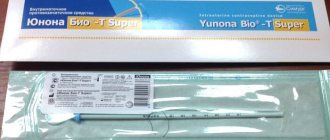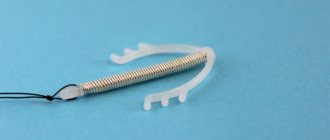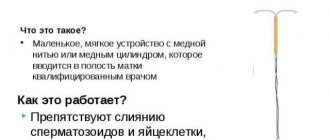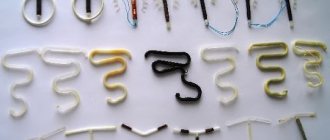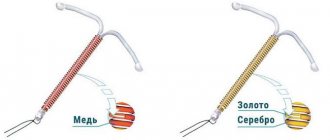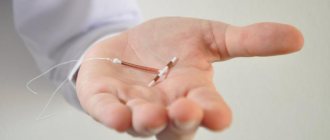The intrauterine device (IUD) is one of the most reliable methods of contraception. Most often it is used by women who have already given birth to children and have a permanent partner. Gynecologists claim that the IUD is second only to hormonal oral contraceptives in its effectiveness, but unlike them, it has no effect on overall health. Reviews of the Juno Bio-T spiral with silver confirm this opinion.
Juno spiral bio-t Ag silver: characteristics, advantages
Most often, women who are sexually active with a regular partner may be prescribed oral contraceptives, that is, pills, or recommended to install an IUD. Taking oral contraceptives can be considered a simpler manipulation, since it does not require the participation of a gynecologist during installation and removal of the contraceptive item itself. However, there are many reasons why the use of oral contraceptives is undesirable.
Juno spiral bio-t Ag with silver, advantages:
- The fact is that after stopping contraceptives, you need to try to protect yourself and prevent pregnancy for about six months. This is due to the fact that the body needs about six months to fully restore its normal cycle.
- There is no need to wait so long after removing such a contraceptive. You can start conceiving right away. In addition, such a contraceptive does not contain any hormones, but is a mechanical means that prevents sperm from penetrating into the uterus. Now on pharmacy shelves there are a huge number of spirals, which differ in their shape, composition, and content.
- The simplest are plastic contraceptives, which are currently practically not used. This is due to the fact that they are poorly fixed inside the cervix and can slip out of it when straining or heavy bleeding during menstruation. Similar second-generation contraceptives include products with copper. However, the fact is that copper can oxidize, which negatively affects the health of the woman and the lining of the uterus. Therefore, it is also advisable not to use such contraceptives due to rapid oxidation and short service life.
Juno
Instructions for using the Juno spiral
Attention! The information is for informational purposes only. The Juno intrauterine device should be inserted only by a qualified gynecologist after examination and relevant tests. Among them:
- Smears for flora from the vagina and cervical canal and for oncocytology.
- Extended colposcopy.
- Ultrasound of the uterus, bladder, appendages and cervix.
The doctor will also determine the presence or absence of contraindications:
- Uterine bleeding of unknown etiology.
- Suspected or confirmed pregnancy.
- Scars on the uterus.
- Inflammations of the genitourinary system of an acute and chronic nature.
- Malformations of the uterus.
- The presence of oncological tumors, as well as cervical stenosis and fibromatosis.
- Deformation of the uterine cavity.
- Adolescence.
- Polyps, cervicitis, ectopia.
If everything is in order and there are no contraindications, the doctor proceeds to install the IUD. The Juno spiral is introduced as follows:
- Mirrors are installed, with the help of which the gynecologist finds the cervix, treats it with a disinfectant solution and grabs the anterior lip with forceps.
- The doctor uses a special probe to measure the length of the uterine cavity.
- Using the device, a spiral is inserted.
- The procedure is completed by trimming the “antennae” of the IUD so that they do not interfere with the woman in the future, and removing the forceps.
- To prevent the development of possible complications and infection, a course of antibiotic therapy is prescribed.
Pregnancy coil Juno Bio T-shaped: instructions for administration
Copper products have been replaced by a new version of contraception, such as silver. In fact, almost all silver coils are made from copper, but with a small amount of silver. It is this that prevents the rapid oxidation of the contraceptive, and also extends its service life. In addition, silver is a metal that disinfects and prevents the penetration and development of opportunistic flora into the vagina.
Accordingly, a woman, subject to all hygiene rules and having a permanent partner, reduces the risk of contracting vaginitis to a minimum. Women who have IUDs are much less likely to suffer from thrush, as well as vaginosis or vaginitis, which is caused by opportunistic microorganisms, such as E. coli.
High-quality contraception
Pregnancy coil Juno Bio T-shaped, instructions:
- As for the Juno spiral with silver, it is a fairly cheap option for contraception. The cost of this product is low, the service life is up to 5 years, and the efficiency percentage is 98%. This is a fairly high probability of protection; a condom provides approximately 99% protection.
- The most interesting thing is that due to the presence of silver in the composition, the risk of endometritis after childbirth is minimized. In general, such contraceptives are recommended for women who had complications during childbirth, and perhaps not all the blood came out, or pieces of the placenta remained inside the uterus.
- Thus, it prevents the proliferation of bacterial flora and improves health.
- For insertion, you must use a special piston and tube. The piston is placed end-to-end to the cervical canal. For dilatation, speculums and a clamp for the lower lip of the cervix are used. After this, the piston is clamped with the tube stationary.
- The contraceptive is administered orally. You need to press on it until you hit the limiter. The tube with the piston is removed, the antennae are cut off, it is necessary that they stick out from the cervical canal by 2 cm. All manipulations are carried out by a doctor.
- Extraction is carried out by pulling the product by the antennae on days 3-7 of the menstrual cycle.
Contraceptives
Types of spirals and their principle of operation
The modern contraceptive market offers a wide selection of intrauterine devices. They differ in composition, duration of use, shape and other parameters. An IUD is a small device made of plastic and metal.
Types of IUDs and their features
There are hormonal and non-hormonal IUDs. Both of them perfectly protect against unwanted pregnancy, but differ in additional properties:
- Non-hormonal ones have an antimicrobial effect and perfectly protect against infection during sexual intercourse.
- Hormonal IUDs have medicinal properties, which can help you get rid of some diseases.
In their form, these contraceptives are as follows:
- Semi-oval.
- Round.
- T-shaped.
- Umbrella
In addition, spirals are divided into various types depending on the material from which they are made:
- Plastic spirals designed for women who are allergic to metal.
- Plastic-metal ones are more efficient and reliable. Gold, silver or copper are used to make them.
Hormonal intrauterine contraceptives contain the substance levonorgestrel. The principle of its action is the process of thickening the mucus that forms in the cervix. Since sperm cannot penetrate the cervical canal, fertilization does not occur. Such spirals are recommended for women with uterine fibroids and a tendency to endometrial growth. The most convenient form is T-shaped spirals. Their price ranges from 10 thousand rubles to 220. The Juno spiral belongs to the budget and effective category.
Indications for use
Any woman of childbearing age can get an IUD. This contraceptive is indicated for those who do not have the ability or desire to use other means of contraception. The advantage of the IUD is that for several years a woman will not have to worry about contraception. This is very convenient for those ladies who often forget to take a birth control pill or are simply inattentive to protective measures.
Contraindications and side effects
This type of contraception is not used during adolescence, and it is also not recommended to place an intrauterine device in nulliparous women. There are a number of diseases for which it is contraindicated:
- Cervical erosion.
- Polyps and fibroids.
- Pathologies of development of the pelvic organs.
- Malignant tumors.
- Malformations of the uterus.
- For bleeding of unknown etiology.
- If an infectious disease is detected, doctors will not perform surgery until the source of infection is completely eliminated.
IUDs are not placed during pregnancy or suspected pregnancy. Among the side effects, first of all, such an unpleasant property of the spiral as ingrowth into the uterine cavity is highlighted. Unfortunately, such cases are not uncommon. The doctor has to literally cut out the structure with part of the uterus.
On what day of menstruation is the Juno bio-t Ag coil with silver placed?
The Juno spiral with silver is made in the shape of an umbrella, which makes its insertion and wearing almost imperceptible.
On what day of menstruation is the Juno bio-t spiral with silver placed?
- Place the product in the vagina during menstruation, approximately on the 3rd fifth day. At this time, the cervix opens slightly, so a foreign object can be inserted into it. The procedure is performed in a gynecologist's office and is virtually painless.
- As a result of installation of the product, only small antennae protrude from the cervix, which can be trimmed if necessary. Accordingly, there are no unpleasant sensations during sex.
- In the same way, contraception is removed during menstruation. Usually removal occurs due to its failure to take root, as well as due to the fact that its service life has passed.
At the doctor's appointment
Side effects from the Juno bio-t Ag spiral
It is worth noting that Juno has shown itself to be excellent and causes minimal complications. Of course, you should be prepared for some side effects that may occur during installation of the spiral and its stay inside.
Side effects from the Juno bio-t Ag spiral:
- Typically, many people note that their periods become longer. A couple of days before your period and two days after it, you may experience brown spotting. This is due to the fact that the mucous membrane may grow as a result of the influence of this contraceptive, and during menstruation a little more comes out than usual. Some women report discomfort during lovemaking because the antennae can get in the way.
- However, when they are trimmed and installed correctly, there are no unpleasant sensations. It is worth noting that immediately after installation, it is necessary to try not to lift weights for a certain period of time, and also not to make love. This is necessary for the contraceptive to take root. Gynecologists note that Juno practically does not grow to the cervix and is easily removed.
- Intermenstrual spotting. That is, brown or red discharge between periods. Usually they are not abundant and disappear within 3 months from the date of installation of the contraceptive. This occurs due to the engraftment of the product inside the cervix.
- Painful and profuse menstruation. That is, menstruation may become heavy. According to gynecologists, it usually also goes away within 3-6 months after installing a contraceptive.
- The risk of infections and injury to the uterus increases. Despite the fact that the spiral contains silver ions, which prevent the emergence and growth of pathogenic microflora, it is still a foreign body to which the body may react inadequately.
- Perforation of the uterine wall. This happens extremely rarely due to the fact that the IUD pierces the wall of the uterus. As a result, bleeding may begin.
High-quality contraception
Spiral Juno bio-t ag, reviews
Typically, such a device is recommended to be placed immediately after the birth of the child. This reduces the risk of becoming pregnant during lactation, when periods are irregular or absent. Usually recommended for women who already have one child. In general, after removing the IUD, there are practically no complications, as well as difficulties with conceiving a baby. However, before installation, try to communicate with girls who have installed or are currently protected using the Juno spiral. There are both positive and negative reviews about the installation. Below are a few of them.
Spiral Juno bio-t ag, reviews:
Marina, 35 years old . I installed the IUD immediately after the birth of my second child at 32 years old. I am now in my third year of IUD. I’m happy with everything, I didn’t experience any discomfort. My periods did not become any longer; they remained absolutely the same as they were. Overall very satisfied. You don't need to take pills that cost a huge amount of money. The spiral as a whole costs a penny, considering that it works for 5 years.
Veronica, 28 years old. Not long ago I installed a spiral, but after a while I had to remove it. She didn't suit me. During menstruation, bleeding was observed, and in general they practically did not end. We can say that for only 7 days from the entire cycle I could make love normally. This is not protection, but real torture. Therefore, 3 months after installation, I went to the doctor and had it removed. It turned out that the spiral was not suitable for me due to physiological characteristics.
Oksana, 23 years old. I just recently gave birth to my first child, and during the postpartum examination, the doctor suggested I get an IUD, and I agreed. In general, if I had found out a little more information, perhaps I would have chosen a different option. Juno won me over with its price, as well as its almost complete safety. In general, I’m generally satisfied, but my periods have become longer. Now instead of 5 days, my period lasts 7 days. I do not experience any unpleasant sensations or nagging pain in the lower abdomen. Overall, I have been using this IUD for 8 months now. There are no unpleasant sensations during sex either. I'm happy, and so is my husband. Now there is no need to worry and think that you can get pregnant.
Spiral appearance
Contraindications to the Juno bio-t ag spiral
Although easy to install and effective, this contraceptive may not be suitable for everyone. There are contraindications for installation.
Contraindications to the Juno bio-t ag spiral:
- Inflammatory diseases of the body of the uterus and appendages
- Past ectopic pregnancy
- Endometritis or endometriosis
- Inflammation of the cervix, dysplasia, erosion, as well as cervicitis
- The presence of malignant and benign neoplasms in the body of the uterus
- Individual intolerance to the alloy from which the contraceptive is made
Before installation
Many gynecologists warn their patients and say that after installing this contraceptive there may be side effects.
Spiral "Juno": general information and existing types
An IUD is a very small device made from plastic and other materials that is inserted into the uterus to prevent fertilization of an egg by slowing down the movement of sperm. It can reduce the “life” of the egg and prevent it from implanting, and in the event of fertilization, this device promotes abortion.
The Juno Bio spiral appeared on the pharmacological market more than two decades ago, and it was developed by Belarusian doctors. In those days it was a real sensation in the field of medicine. Since quite a lot of time has passed, and technology does not stand still, the product is produced in several forms: T-shaped (Bio-T), f-shaped (Bio Multi) and ring-shaped. All these types differ not only in their structure - they are made with the addition of various materials.
